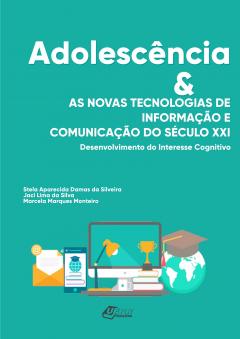Adolescence & New 21st Century Information and Communication Technologies: Development of cognitive interest
Keywords:
Education, Technologies, Cognitive development, AdolescenceSynopsis
The correlations between cognitive development in adolescence and technologies have been studied in recent decades, based on new discoveries of neuroscience and the introduction of Information and Communication Technologies (ICT) in formal education. The breakthroughs in the adolescent brain, driven by technological advancement, enable parents and educators to understand in what ways technologies can foster the development of cognitive interest. This is a controversial discussion that questions the positive and negative aspects of this relationship. In this study, we intend to demonstrate the contributions of ICT used in education to the development of cognitive interest of adolescents, without disregarding socio-emotional aspects that also interfere in the relationship school, students and learning. From the Critical Discourse Analysis (ADC), we analyze the didactic material used by the Educational Technology Center in Roraima (NTE / RR). The NTE / RR responsible for the continuing education of teachers, aiming to detect relevant theoretical and practical aspects on the theme of the development of cognitive interest of adolescents, and the relationship of this learning with the construction of their school practices, which include technologies. Also at this stage, we outline the perspectives for the learning process from the use of ICT in schools, correlating them in a convergent manner with the development of cognitive interests of adolescents.
Chapters
-
PARTE I
-
ADOLESCÊNCIA E DESENVOLVIMENTO COGNITIVO
-
INFLUÊNCIAS DO DESENVOLVIMENTO SOCIOEMOCIONAL DO ADOLESCENTE NA APRENDIZAGEM
-
OS ADOLESCENTES E AS TECNOLOGIAS
-
PARTE II
-
CONTRIBUIÇÕES DA UTILIZAÇÃO DAS TIC NAS ESCOLAS PARA O DESENVOLVIMENTO DO INTERESSE COGNITIVO DOS ADOLESCENTES, ESTUDANTES DE ENSINO MÉDIO EM BOA VISTA, RORAIMA
-
PERFIL DOS ADOLESCENTES PESQUISADOS
-
DADOS DO CENSO ESCOLAR DO ESTADO DE RORAIMA/2015
-
ANÁLISE DAS ENTREVISTAS COM GESTORES E PROFESSORES DAS ESCOLAS PÚBLICAS DE ENSINO MÉDIO DA CAPITAL
-
Entrevistas com professores
-
Os obstáculos encontrados
-
As práticas sociais
-
A ordem social
-
Análise interacional do discurso
-
MUDANÇAS POSSÍVEIS PARA SUPERAR OS OBSTÁCULOS
-
Análise do material obtido nas entrevistas com gestores
-
Análise interacional do discurso sobre o interesse dos estudantes
-
A ordem social e as mudanças possíveis na superação dos obstáculos
-
Reflexão sobre a análise de entrevistas com gestores
-
ANÁLISE DO MATERIAL DIDÁTICO UTILIZADO PELO NTE/RR NOS CURSOS DE FORMAÇÃO CONTINUADA DE PROFESSORES
-
INTRODUÇÃO À EDUCAÇÃO DIGITAL
-
O interesse cognitivo dos adolescentes: aspectos físicos e psicossociais
-
O ensino
-
A aprendizagem
-
REFLEXÃO SOBRE A ANÁLISE DO MATERIAL DIDÁTICO
-
Elaborações de projetos
-
Eixo: Projeto
-
Eixo: Currículo
-
Eixo: Tecnologia
-
REFLEXÃO SOBRE A ANÁLISE DO CURSO DE ELABORAÇÃO DE PROJETOS
-
PARTE III
-
PERSPECTIVAS PARA O DESENVOLVIMENTO DO INTERESSE COGNITIVO DOS ADOLESCENTES A PARTIR DA UTILIZAÇÃO DAS TICs NA ESCOLA
-
EM RELAÇÃO AO INTERESSE DOS ADOLESCENTES PELA ESCOLA
-
EM RELAÇÃO À ÉTICA E À CONSTRUÇÃO DE VALORES NA ADOLESCÊNCIA
-
A IMPULSIVIDADE E O AUTOCONTROLE NA ADOLESCÊNCIA
-
ADICÇÃO NA ADOLESCÊNCIA
-
OS ADOLESCENTES E AS EMOÇÕES
-
PROCESSAMENTO COGNITIVO EFICIENTE NA ADOLESCÊNCIA
-
RACIOCÍNIO MAIS SOFISTICADO NA ADOLESCÊNCIA
-
CONSTRUÇÃO DO RACIOCÍNIO ABSTRATO NA ADOLESCÊNCIA
-
A ADOLESCÊNCIA E A CAPACIDADE DE ELABORAR PROPOSTAS, CONSTRUIR TEORIAS E REFLETIR SOBRE ELAS
-
A ADOLESCÊNCIA E O PROCESSO DE ELABORAÇÃO DE HIPÓTESES
-
O DESEJO DE PARTICIPAÇÃO DO ADOLESCENTE
-
A BUSCA PELA IDENTIDADE PESSOAL
-
APEGO AOS GRUPOS SOCIAIS
-
ADOLESCÊNCIA E LETRAMENTO
-
VELOCIDADE DO PENSAMENTO E DE COMUNICAÇÃO
-
A ATENÇÃO NA ADOLESCÊNCIA
-
DESENVOLVIMENTO DO CONTROLE INIBITÓRIO
-
GERENCIAMENTO DA MEMÓRIA DE TRABALHO NA ADOLESCÊNCIA
-
CONSIDERAÇÕES FINAIS
-
REFERÊNCIAS BIBLIOGRÁFICAS
Downloads



